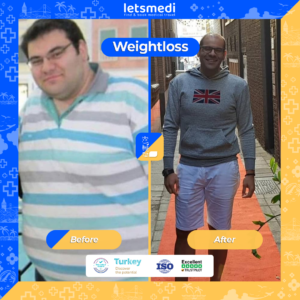Weight Loss Surgery in Turkey is one of the most popular options for people that come from abroad to Turkey for weight loss.
Becoming overweight or obese raises a person’s risk of a variety of health issues. Obesity and weight loss surgery can assist these patients in losing weight and therefore lowering their risks.
Turkey provides economical and high quality healthcare with short wait periods, making it one of the finest possibilities for health tourism, such as weight loss surgery. In Turkey, there are numerous types and solutions for obesity and weight loss surgery.
The average cost of Weight Loss Surgery in Turkey ranges between 1.250 USD (1.000£) – 5.420 USD (4.470£) which is the most affordable option compared to abroad. We are doing Weight Loss Surgery in Istanbul, Antalya and Izmir, you can choose the best option for you.
Here you can find out and discover Weight Loss Surgery journey in Turkey. Check all the details about Weight Loss Surgery costs, our clinic’s patients reviews, before & after photos from the best doctors, all-inclusive packages for Weight Loss Surgery in Turkey.
You can get in touch with us for Weight Loss Surgery in Turkey via WhatsApp or options below.
What Is Weight Loss Surgery?
Weight loss surgery (bariatric surgery) consists of various operations performed to support weight loss. However, such surgical interventions are usually seen as a last resort. Patients are primarily encouraged to lose weight with diet, physical activity and pharmacological treatments; however, obesity surgery may be resorted to when these methods do not yield sufficient results.
Weight Loss Surgery in Turkey Overview
| Weight Loss Surgery in Turkey Details | |
| Operation | Weight Loss Surgery |
| Candidates | Persons between 18-65 and body mass index (VKI) 40 or higher (excessive obesity) |
| Procedure: | it is a procedure to reduce the amount of food you can eat and absorb by reducing the stomach. |
| Duration: | 1 hour |
| Stay: | 1-3 days |
| Anesthesia: | General |
| Recovery: | 2-3 weeks |
| Side Effect: | Gastrointestinal obstruction. Hernias. Gastroesophageal reflux. Low blood sugar (hypoglycemia) Malnutrition. Vomiting. |
| Exercise: | After 1 week |
| Scars: | Tiny scars |
| Pain: | Minimal |
| Results: | 1 month |
Advantages of Weight Loss Surgery in Turkey
The biggest advantage of Weight Loss Surgery in Turkey is much cheaper prices compared to countries such as UK and USA. Along with cheap prices, holiday opportunities, quality services, world-renowned doctors (Prof. Dr. Hasan Erdem and Assoc. Dr. Abdullah Şişik) and health professionals who communicate with you in your language. VIP Transfer, accommodation in 5 star hotels and city tours…
Why Choose Turkey for Weight Loss Surgery?
- Well-equipped and state-of-the-art hospitals
- Doctors specialized in their field
- Favorable prices
- Accommodation facilities
- Health professionals who will always be in contact with you (communicating in your language)
- VIP airport transfers
- City tours
- Holiday facilities
- 5 star hotels
- Preoperative and postoperative analysis and follow-up
- 24 hours support
- Successful results
Is Weight Loss Surgery Safe in Turkey?
The short answer is that Turkey is a safe country to travel to for weight loss surgery and other medical procedures. But don’t worry if you have any doubts while doing your internet research and come across the question, “Is it safe?” This issue frequently comes up, and not just in Turkey’s situation. However, everywhere in the world, especially if it’s a medical procedure abroad.
In Turkey, however, if you are planning to undergo a medical operation or, in this example, a weight loss surgery and have previously made a reservation with your preferred hospital, you will typically have your own personal transporter. Should not be concerned about your safety traveling around.
What are the Weight Loss Surgery Risks?
Weight loss surgeries are slightly risky surgeries. This is due to the fact that the process requires follow up and attention.
- Following surgical treatment, either your food intake decreases or your body absorbs fewer nutrients. As a result, you may experience mineral and vitamin deficiencies, as well as other complications.
- The prime cause is that each type of surgery, including bariatric surgery, have complication rates.
- Leaking: One of the most widespread complications that can occur up to three days after gastrointestinal surgery. Following bariatric surgery, surgeons should monitor patients and check their heartbeats on a regular basis. A rapid heart rate of more than 120 beats per minute, fever, and any stomach discomfort are all concerning signs of a leak. There is really nothing to be concerned about if the disease is detected early and treated promptly.
- Bleeding: Unfortunately, one of the most widespread postoperative complications is bleeding, which occurs in up to 11% of sleeve gastrectomy and gastric bypass procedures. Mercifully, in 85% of these cases, the bleeding can be stopped without the need for surgical intervention. Non operative methods for controlling and managing bleeding include hemodynamic monitoring, serial ferritin, and blood product organ transplants, to name a few. If your surgeon is unable to control the bleeding non-surgically, you will require emergency surgical intervention.
- Obstruction of the Bowel: Small bowel obstruction is most common following gastric bypass surgery. It is usually caused by an internal hernia. Its likelihood ranges from 0% to 5%.
- Embolism of the Pulmonary Arteries: One of its most common complications, particularly after gastric bypass, is pulmonary embolism (PE). Age and a higher incidence of obesity (BMI) increase the likelihood. This complication is possible for several weeks after surgery. During this time, PE prophylaxis (a treatment plan to prevent pulmonary embolism) is required.
Weight Loss Surgery FAQ in Turkey
Why is Turkey the best option abroad for weight loss surgery?
What makes Turkey the best for weight loss surgery? Well, basic things like the safety of your being in the country or the procedure itself, the cost you have to pay is much more affordable than any European country, but more importantly, the medical treatments are world-class.
You can see this for yourself by visiting any of the hospitals or private clinics you’re considering for your weight loss surgery; the reviews and previous patient satisfaction can help you choose whether it’s the best option for you.
Patients cannot be cheated if you book something online these days. Both the good and the bad are on display.
Why is Weight Loss Surgery More Affordable in Turkey?
Turkey offers the most affordable weight loss surgery treatments in the European region, with a cost difference of 70% less than what it would cost in the U.s. This can quickly raise any questions or concerns for a person who can’t afford the cost of weight loss surgery in their home country but needs a life-changing solution and can’t gamble with their life for a penny.
However, in the case of Turkey’s more affordable medical procedures, it can contribute to a range of reasons. One of them is the difference in daily life costs compared to what it is like in The Us or the UK. While many individuals earn a greater wage, the cost of living in those countries is considerably higher; this factor influences more than it seems.
Who is the best weight loss surgeon in Turkey?
As you know, weight loss surgeries are very diverse. It would not be right to give just a name about the best weight loss surgeon in Turkey. Because the specialist surgeon of each weight loss surgery is different. For example, the best surgeon for gastric sleeve surgery is another. Or the best surgeon in gastric bypass surgery is someone else. So the names don’t matter. The important thing is that Turkey is the best and most successful country in weight loss surgeries. But we can give you a few tips. To find the best surgeon, first find out his references. Learn about his education and experience. In fact, if necessary, get information from the patients he treats.

Weight Loss Surgery Prices in Turkey
| Gastric Sleeve in Turkey | 2,750€ |
| Gastric Bypass in Turkey | 3,500€ |
| Sleeve Revision Surgery in Turkey | 3,500€ |
| Gastric Balloon in Turkey | 1390€ – 2390€ |
| Allurion Gastric Balloon in Turkey | 2,390€ |
Weight Loss Surgery Price Comparison - Turkey vs. UK, USA
| Country | Price |
|---|---|
| Turkey (Letsmedi) | 2,750 – 3,500 Euros |
| Turkey (Average Price) | 4,000 – 7,000 Euros |
| France | 7,000 – 12,000 Euros |
| Switzerland | 9,000 – 13,000 Euros |
| United Kingdom | 11,000 – 15,000 Euros |
| United States | 15,000 – 25,000 Euros |
| Canada | 15,000 – 25,000 Euros |
Weight Loss Surgery Turkey Before & After Photos






Weight Loss Surgery Turkey Reviews

Posted on
GoogleBest Weight Loss Doctors in Turkey
Assoc. Prof. Dr. Abdullah Şişik
Dyt. Hafize Kovancı
Luna Dorothy
Get Information Now

Luna
Medical Travel advisor











Posted on
Google